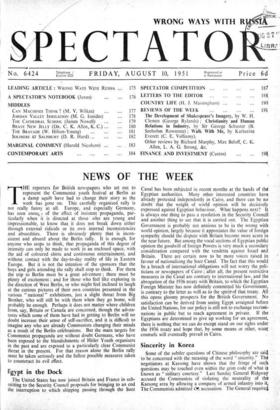Egypt in the Dock The United States has now joined
Britain and France in sub- mitting to the Security Council proposals for bringing to an end the interruption to which shipping passing through the Suez Canal has been subjected in recent months at the hands of the Egyptian authorities. Many other interested countries have. already protested independently in Cairo, and there can be no doubt that the weight of world opinion will be decisively expressed against Egyptian behaviour. What happens next? It is always one thing to pass a resolution in the Security Council- and another thing to see that it is carried out. The Egyptian Government is probably not anxious to be in the wrong with world opinion, largely because it appreciates the value of foreign sympathy should the dispute with Britain become more acute in the near future. But among the vocal sections of Egyptian public opinion the goodwill of foreign Powers is very much a secondary consideration compared with the vendetta against Israel and Britain. There are certain now to be more voices raised in favour of nationalising the Suez Canal. The fact that this would be a breach of international obligations will not wdrry the poli- ticians or newspapers of Cairo ; after all, the present restrictive measures in the Canal are contrary to international law, and the abrogation of the 1936 treaty with Britain, to which the Egyptian Foreign Minister has now definitely committed his Government. is contrary to the letter as well as to the spirit* of that treaty. All this opens gloomy prospects for the British Government. No satisfaction can be derived from seeing Egypt arraigned before the United Nations, for our policy is still not to exchange recrimi- nations in public but to reach agreement in private. If the Egyptians are determined to give up working for an.agreement, there is nothing that we can do except stand on our rights under the-1936 treaty and hope that, by some means or other, wiseg counsels will eventually prevail in Cairo.






























